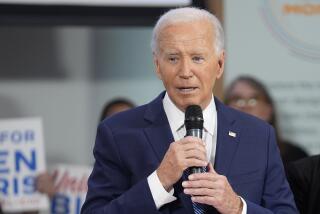Editorial:: The No. 1 debate question for Democrats: Who can undo Trump’s damage?

With this week’s two highly anticipated and much handicapped debates, the huge field of candidates for the 2020 Democratic presidential nomination will begin in earnest what will be a long process of presenting themselves to potential voters.
We’re eager of course to hear the candidates delineate their positions on issues of domestic and foreign policy — from how to provide quality healthcare to more Americans to how to address the crisis of college debt to how to respond to foreign policy challenges in Iran, North Korea, China, Russia and elsewhere. But this year, we’re also especially interested — and we suspect many Democratic voters will be as well — in whether the candidates can demonstrate that they possess the basic qualities of character and gravitas that are so lamentably lacking in the incumbent.
Those qualities include seriousness, diligence, consistency, an appreciation of this country’s diversity, an understanding of how the federal government works (or the capacity to learn), a willingness to engage political opponents in good faith and, last and emphatically not least, a moral compass. In a more rational world, such traits would, of course, be a given — a minimal baseline for any credible presidential candidate. Today, sadly, that is not the case.
Four more years of a Trump presidency would be catastrophic for the country.
The debates this week — two sessions with 10 candidates each, the first airing on Wednesday and the second on Thursday — will afford the candidates a limited but still valuable opportunity to define themselves. Future debates will provide a fuller picture, and when the field begins to winnow next year, the contrasts will become even clearer.
Some of those differences will be matters of style, others of substance. Differences among the Democratic aspirants on policy questions already have emerged, for example over the future of healthcare policy and whether government-provided insurance (like that provided by Medicare) should be expanded to replace the private insurance market.
Yet even at this early stage, it’s important that the would-be Democratic nominees focus on showing that they could not only bring a merciful end to Donald Trump’s misrule but also that they could effectively repair the damage he caused. Their credibility on that point is all-important.
At home, the next president will have to deal with a poisonous polarization and an outbreak of right-wing extremism that Trump has exacerbated even if he didn’t create it. Abroad, the challenge will be to repair alliances and international agreements that Trump has trashed as part of an erratic and unprincipled “America first” foreign policy that often seems more like “America alone.”
Obviously — or it should be obvious — the next president must be a leader whose word can be trusted, by the public, by members of Congress and by other nations.
It’s true that all politicians exaggerate and bend the truth. But among recent presidents, Trump is uniquely indifferent to whether what he says has any basis in reality.
Enter the Fray: First takes on the news of the minute »
As a result, he serves up one massive misstatement after another, whether the subject is Special Counsel Robert S. Mueller III’s “witch hunt”; supposed voter fraud on behalf of Democrats; or the sincerity of North Korean leader Kim Jong Un. Meanwhile, Trump endlessly accuses others — including political opponents, civil servants and the “fake news” media — of lying (and even, on occasion, of “treason”), thereby corroding public confidence in institutions on which democracy depends.
Of course, Democratic aspirants need to do more than denounce Trump and promise to do better. The candidates also need to convince voters that they would be able to address the problems that preceded Trump’s election — for example, political paralysis and the failure of Congress to effectively address complicated questions such as immigration reform. The next president must work effectively with the legislative branch, including with members of the other party.
Four more years of a Trump presidency would be catastrophic for the country. So it is absolutely essential that the Democratic nominee be “electable.” But electable shouldn’t be merely a synonym for “old” or “white” or “male” or “centrist.” We have yet to learn which of the many Democratic contenders will be able to parlay enthusiasm into votes in a general election against Trump.
If the current president is to be defeated, though, some Democratic voters may ultimately have to throw their support behind a nominee who prevailed in the primaries but whose views don’t perfectly map on to their own policy preferences. At some point, generational and ideological differences among Democrats must yield to the imperative of replacing Trump with a credible and competent alternative.
Such a reckoning is many months in the future, but it’s not too early for Democratic candidates to start making the case for why they deserve to be that alternative. We hope they will make that their priority in this week’s debates and those that follow.
Follow the Opinion section on Twitter @latimesopinionand Facebook
More to Read
A cure for the common opinion
Get thought-provoking perspectives with our weekly newsletter.
You may occasionally receive promotional content from the Los Angeles Times.






